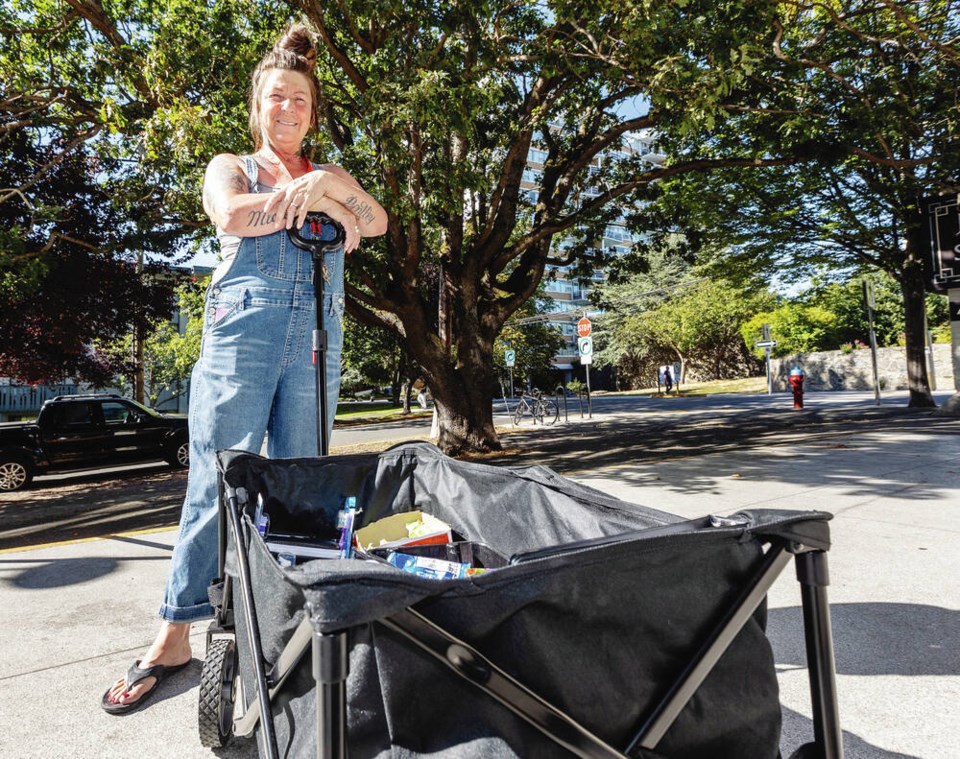Karen Mills has been loading up her cart the last two days with a cooler of cold bottled water and watermelon, and visiting people on the streets in Victoria who are struggling with the extreme heat.
Mills, who runs Peer2Peer Indigenous Society, is out for a few hours in the morning and again in the evening, checking on people along Douglas Street, in Centennial Square and on Pandora Avenue.
People are crowded together on concrete, baking in tents and on the street without shade, she said.
“I’ve been inside of a tent when it’s literally scorching hot outside,” Mills said. “It’s hotter inside the tent. And there’s no airflow because they’re all so squished together.”
She’s been going through multiple cases of bottled water each day trying to help people stay hydrated as much of the Island experiences a prolonged heat wave.
Daytime temperatures around 30 C are expected to last through Wednesday in Greater Victoria and East Vancouver Island from Nanaimo to Campbell River, and through Thursday from Duncan to Nanaimo, according to a heat warning issued by Environment and Climate Change Canada.
A special weather statement is in place warning of highs of 30 to 35 C for Inland Vancouver Island.
In Nanaimo, the Wisteria Community Association is handing out bottled water and ice from their kitchen during the day, and switching their usual hot evening meals to cold foods to help people stay cool.
Tanya Hiltz, president of the association, said most people without homes are playing it smart and spending their days near water where they can cool off.
B.C. Emergency Health Services said paramedics were called out to 28 heat-related events on Sunday and Monday, compared with nine on the same two days a week earlier.
B.C.’s Ministry of Emergency Management has said the heat wave won’t be a repeat of the 2021 heat dome, which claimed an estimated 600 lives, but it warns people to take precautions to stay out of the heat, drink water and limit activity.
The coroner’s report from the 2021 heat dome said most of the deaths happened indoors and were adults above 60 years old who didn’t have air conditioning.
“If you are [a senior living] alone, you need to make sure you are keeping in touch with somebody on a regular basis,” said Leslie Gaudette, president of the Council of Senior Citizens’ Organizations of B.C.
Family, friends and neighbours are being urged to keep watch over older citizens. That may mean checking in to see if someone is keeping cool or needs to temporarily relocate to a family or friend’s place if a home gets too hot.
During the 2021 heat dome, Gaudette learned “we [seniors] don’t adjust to the heat as easily as a younger person so we are more likely to get overheated.”
Chronic illnesses and issues with circulation can all contribute to an individual’s ability to cool down, she said.
She recommends that seniors go to the closest seniors centre or other facility with air conditioning when temperatures rise.
Symptoms of heat illnesses include swelling, rash, cramps, fainting, heat exhaustion, heat stroke and the worsening of some health conditions.
Environment Canada said more than a dozen daily records were set on Tuesday, including 37.5 C in Port Alberni, breaking a benchmark set in 1933, and 30.6 C at Yoho National Park, surpassing a 1930 mark.
B.C. Hydro said Tuesday that it set a record for the highest peak hourly demand in August on Monday night. Consumption went over 8,400 megawatts.
Bulletins from Environment Canada say much of the coastal region will return to seasonal temperatures by Wednesday night, but central and southern regions of the province will endure the heat a day or two longer.
— With files from The Canadian Press and Carla Wilson



